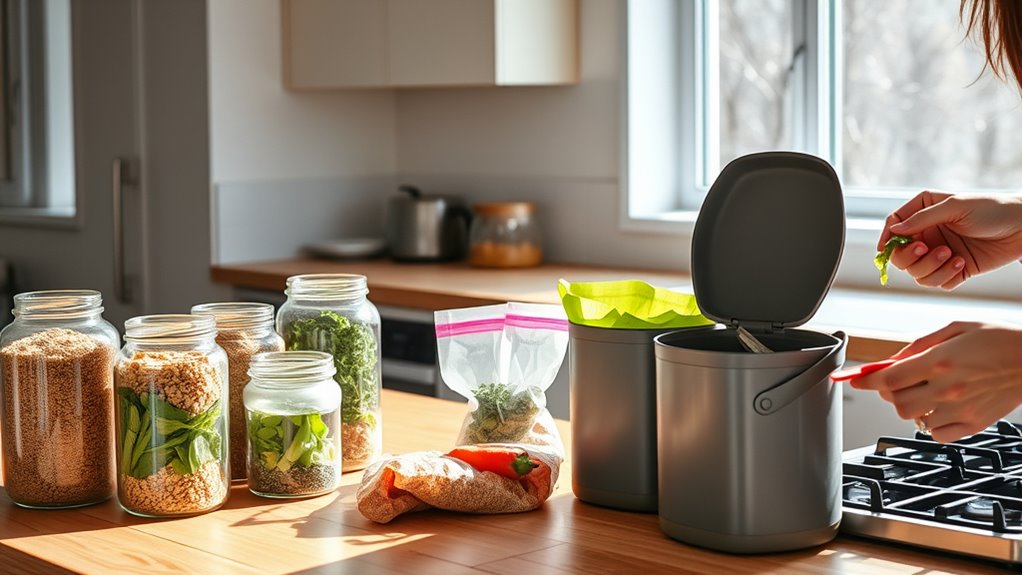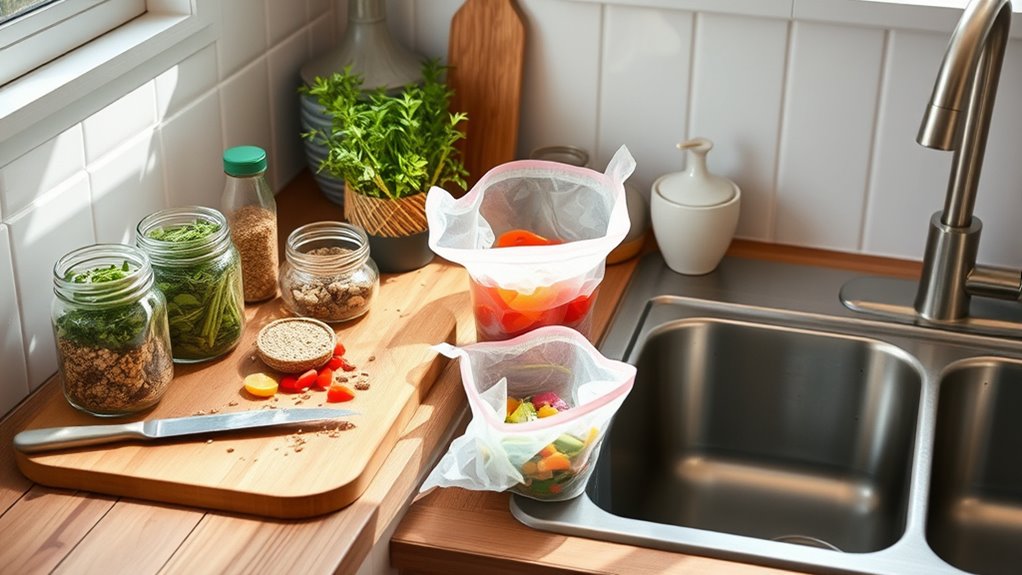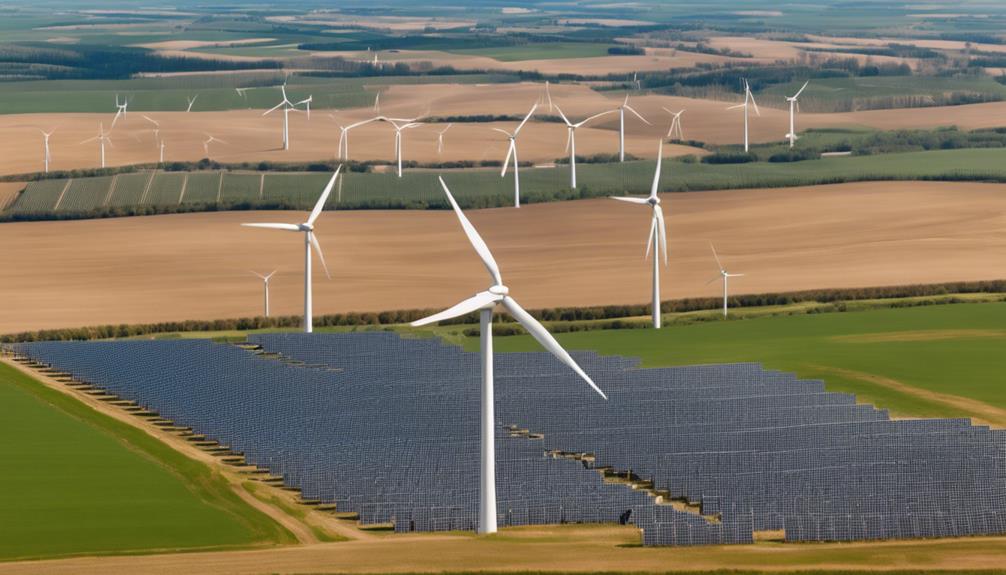To cook with less waste, embrace zero waste habits by planning your meals, shopping with reusable containers, and using all parts of produce. Compost food scraps like vegetable peels and coffee grounds to keep waste out of landfills. Opt for energy-efficient appliances and batch cooking to save power. Combine these simple hacks with mindful shopping and leftovers repurposing to create a more sustainable kitchen—discover even more ways to make your cooking eco-friendly.
Key Takeaways
- Plan meals and shop with reusable containers to minimize packaging waste and prevent overbuying.
- Use all parts of produce and repurpose leftovers to reduce food scraps and avoid disposal.
- Set up a compost bin for food scraps, keeping it accessible to encourage regular use.
- Incorporate energy-efficient appliances and batch cooking to lower energy consumption and waste.
- Combine zero waste practices with mindful routines for an eco-friendly, cost-effective kitchen environment.

Are you looking for simple ways to make your kitchen more eco-friendly? Small changes can add up quickly, especially when you focus on reducing waste and adopting sustainable habits. One of the most effective approaches is embracing zero waste principles. Zero waste isn’t about being perfect but about making intentional choices to minimize the trash you produce. Start by evaluating what you toss most often—food scraps, packaging, or single-use items—and look for ways to cut back. Incorporate reusable containers, beeswax wraps, and cloth bags into your routine to cut down on disposable plastics. Using all parts of your produce also helps reduce waste; for instance, broccoli stems and carrot tops can be turned into soups or pesto. These small shifts help you produce less garbage and make your kitchen more sustainable.
Embrace zero waste habits to reduce kitchen trash and make your space more eco-friendly.
Composting tips are key to turning food scraps into valuable soil amendments, further reducing your waste footprint. If you haven’t already, set up a compost bin in your kitchen or backyard. Keep it accessible so composting becomes part of your daily routine. Be mindful of what you toss into your compost—avoid meat, dairy, and oily foods that can attract pests or create odors. Instead, add fruit and vegetable scraps, coffee grounds, eggshells, and yard waste. Turning your kitchen waste into compost not only diverts it from landfills but also enriches your garden naturally. Regularly turning your compost and maintaining proper moisture levels will ensure it breaks down efficiently. Over time, you’ll see how composting tips can transform kitchen scraps into nutrient-rich soil, closing the loop on waste and supporting sustainable gardening.
Another effective hack is meal planning and smart shopping. When you plan your meals, you buy only what you need, reducing impulse purchases and food spoilage. Use shopping lists to avoid overbuying and packaging waste. Opt for bulk sections or package-free options when possible, and bring your own containers to stores. Properly storing leftovers and using them creatively prevents food from going to waste. For example, day-old bread can become croutons, and leftover vegetables can be turned into soups or stir-fries. These habits help you cook with less waste and save money, all while benefiting the environment.
Finally, consider investing in energy-efficient appliances and LED lighting, which cut down on electricity use. Use your stovetop and oven efficiently by batch-cooking or cooking multiple dishes at once. Every small effort counts when it comes to making your kitchen more sustainable. By integrating zero waste practices, composting tips, and mindful shopping, you can create a kitchen that’s both eco-friendly and economical. Making these changes might take some adjustment, but the positive impact on the planet—and your wallet—makes it all worth it.
Frequently Asked Questions
How Can I Compost Kitchen Scraps Effectively at Home?
To compost kitchen scraps effectively at home, start by choosing a composting bin that’s easy to access and maintain. Collect your kitchen scraps like vegetable peels and coffee grounds regularly, and add them to the bin. Turn the compost occasionally to aerate it, helping it break down faster. Keep the bin in a dry, ventilated spot, and avoid adding meat or dairy to prevent odors and pests.
What Are the Best Eco-Friendly Storage Solutions for Leftovers?
Storing leftovers is like planting seeds for future meals. You should choose eco-friendly options like reusable containers and biodegradable wraps, which are the guardians of your food’s freshness. Reusable containers keep your leftovers secure and reduce waste, while biodegradable wraps offer a natural alternative to plastic. Together, they help you cut down on plastic pollution and keep your kitchen sustainable, making every meal a step toward a greener planet.
How Do I Reduce Water Usage While Cooking?
To reduce water usage while cooking, focus on water conservation and efficient dishwashing. Use only the amount of water needed for boiling or steaming, and cover pots to cut down on evaporation. When washing dishes, scrape off excess food and fill the sink with soapy water instead of running the tap. These small steps help save water, reduce waste, and make your cooking more eco-friendly.
Are There Sustainable Alternatives to Plastic Kitchen Tools?
Imagine a knight swapping his steel sword for a biodegradable utensil—it’s the same with your kitchen tools. You can replace plastic utensils with biodegradable options that break down naturally, reducing waste. Reusable baking mats are another eco-friendly choice, letting you ditch single-use paper or foil. These sustainable alternatives help you cut down plastic use, protect the environment, and still get your cooking done efficiently.
How Can I Plan Meals to Minimize Food Waste?
To minimize food waste, plan your meals ahead of time by creating a detailed shopping list based on your weekly meal prep. Stick to the list to avoid impulse buys, which often lead to leftovers that go bad. Use versatile ingredients across multiple recipes to reduce excess. Proper storage also helps keep food fresh longer, so organize your fridge and pantry to easily see what you have and prevent spoilage.
Conclusion
By embracing these simple sustainable kitchen hacks, you can reduce waste, save money, and support a healthier planet. Small steps like smart shopping, savvy storage, and mindful meal prep make a big difference. So, start sustainable, stay smart, and savor a cleaner, greener kitchen. Remember, your mindful methods make a massive impact—turn your kitchen into a hub of harmony and hope. Together, let’s create a more mindful, more manageable, and more sustainable space!









